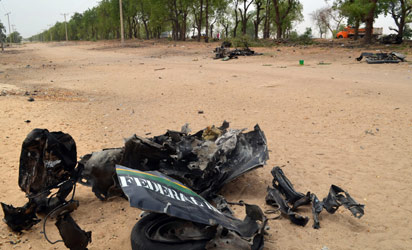Featured
More Than 1,000 People Killed In Boko Haram Conflict Since January 2014

LAGOS (AFP) – More than 1,000 people have been killed so far this year in three states in northeastern Nigeria worst hit by Boko Haram violence, according to the country’s main relief organisation.
The National Emergency Management Agency (NEMA) figures are the starkest indication yet of the increase in bloodshed in Borno, Adamawa and Yobe that have caused growing concern.
NEMA said in a presentation in Abuja on Tuesday that people living in the states were “caught up in an intensifying conflict”, which has been raging since 2009.
“The human toll: more than 1,000 people dead and 249,446 displaced between January to March 2014… One in five of the total population are not living in their own homes,” it added.
Violence has increased in northeastern Nigeria since the new year, including a high-profile attack on a boarding school in Yobe, which saw dozens of students slaughtered in their beds.
A state of emergency imposed in the three states in May last year has largely forced the militants out of urban centres but villagers in remote, rural areas have borne the brunt of continued attacks blamed on the Islamist extremists.
NEMA said that some 3.2 million people — nearly a third of the overall population in the three states — were affected by the crisis, most of them women, children and older people.
A total of 244,000 were living with friends or relatives and just over 5,000 were in camps.
“Immediate assistance” was required for 1.5 million people while there needed to be an “urgent and significant scale-up” of humanitarian assistance, especially of food, water and healthcare.
Nigeria’s government has been criticised for its apparent inability to end the Boko Haram insurgency, with a focus on the military’s tactics to deal with guerrilla fighting by the Islamists.
Military top brass, however, maintain that a troop surge plus recent restrictions on the insurgents’ ability to seek safe haven outside Nigeria has prompted them to lash out and attack.
Boko Haram, which wants to create a separate strict Islamic state in northern Nigeria, was depleted in both numbers and weaponry, officers say.
NEMA’s estimate on the current death toll is the highest among agencies tracking the conflict.
Human Rights Watch said on March 14 that 700 people had died since the turn of the year and that there had been “mass displacement” of residents, without giving exact figures.
The Council on Foreign Relations think-tank’s “Nigeria Security Tracker”, which documents violent deaths by perpetrator, said that 650 people had been killed between January 5 and February 23.
The United Nations has said that nearly 300,000 people had been internally displaced from the start of emergency rule to January 1 but has not yet provided figures for this year.






